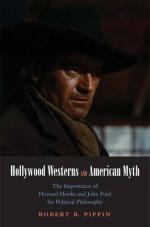|
This section contains 1,304 words (approx. 5 pages at 300 words per page) |

|
On all levels of Ford's work, Catholic dogma, philosophy and imagery play an important role. At the most basic, religious morality affects his choice of plots; speaking of sexual subjects, he remarked "they would be against my nature, my religion and my natural inclinations." A powerful religious conscience is apparent in his selection of the moral lessons for which his films are always vehicles. All of these reflect Catholic thinking. He supports the concept of a "just war" in favour of the American liberal view best synopsised as "War is hell, but …," assigns to large social groups a collective piety, implies in all deaths the existence of an afterlife, accentuated by his habit of bringing back the dead, either in concluding flashbacks, or by implication in the form of portraits, themselves imitative of religious images; the quasi-devotional offering of flowers before portraits of women is common in his...
|
This section contains 1,304 words (approx. 5 pages at 300 words per page) |

|


